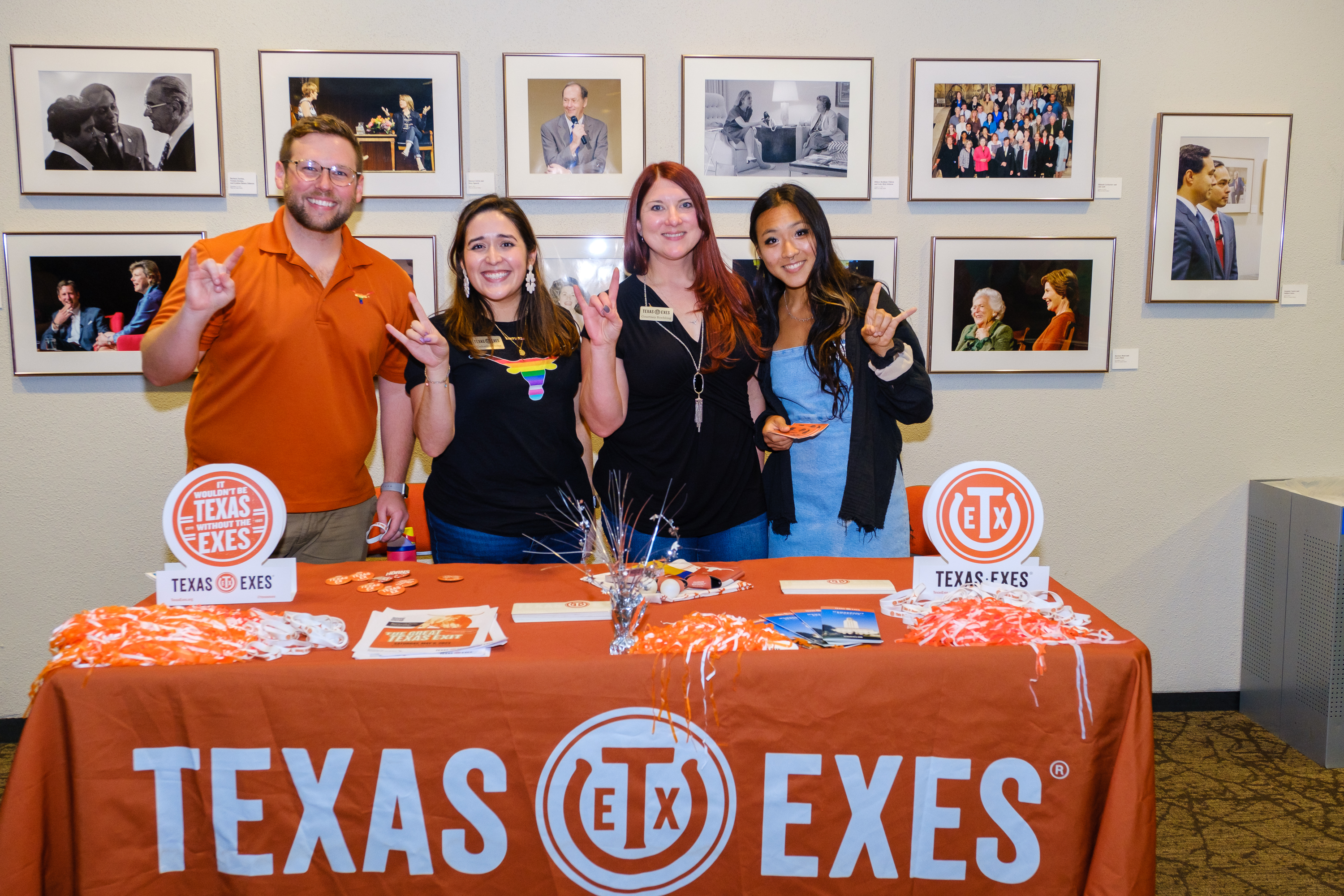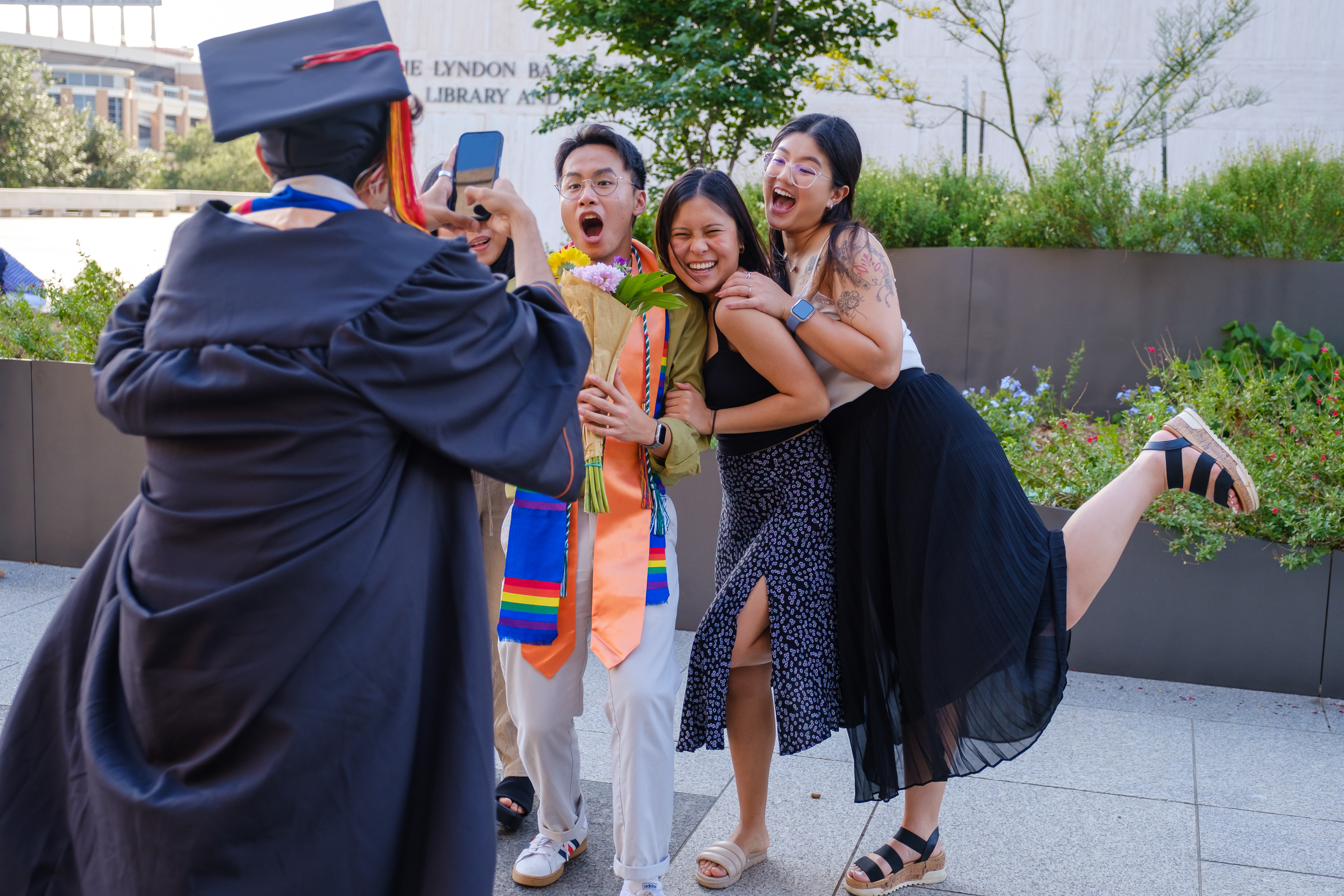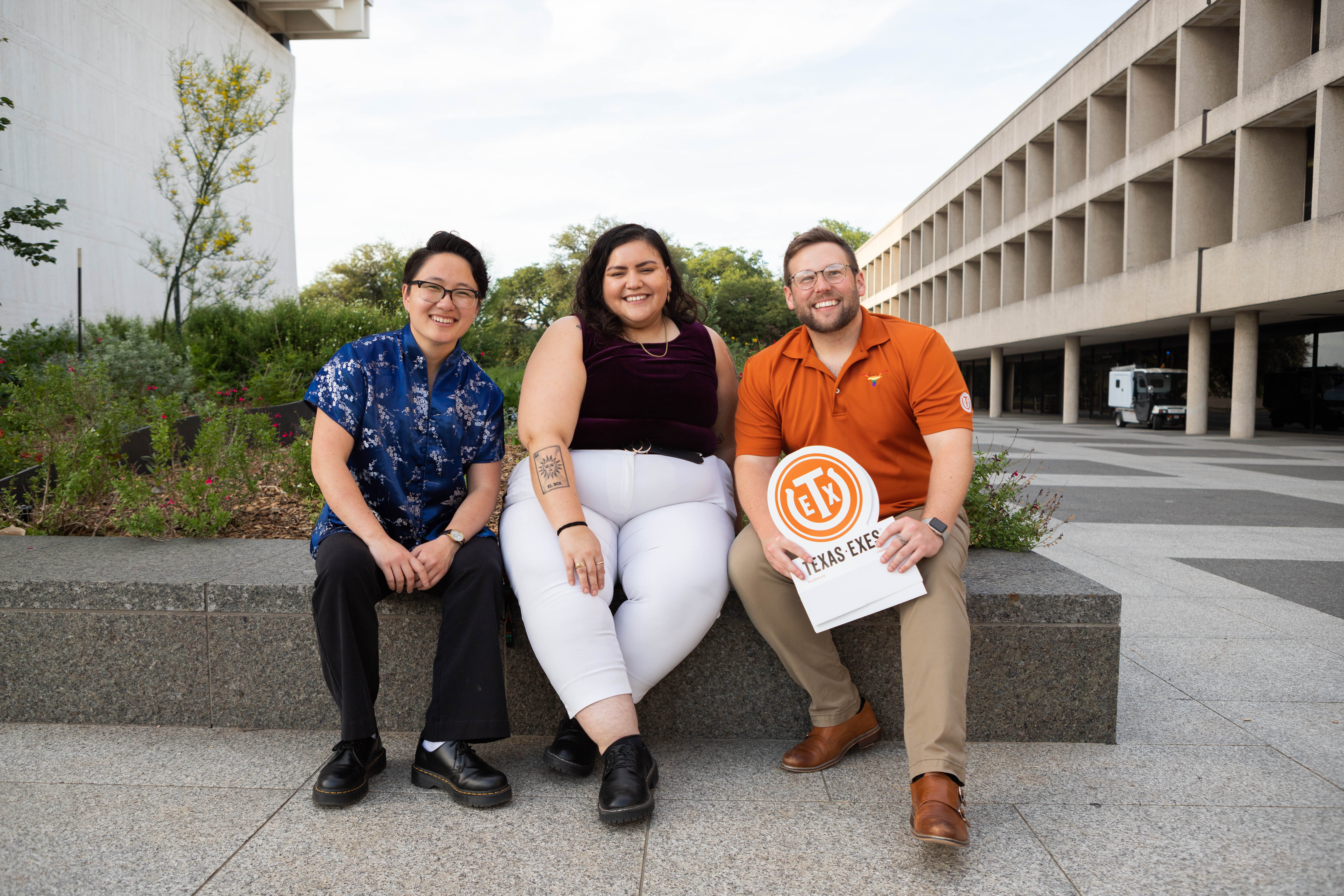This Texas Exes Alumni Network Celebrates Pride on the Forty Acres and Beyond
The only thing that makes Catherine Flores, BA ’16, MA ’19, prouder than sporting her rainbow Longhorn T-shirt is when fellow Texas Exes stop to ask her where she got it—giving her the perfect opportunity to tell them about the Texas Exes Pride Alumni Network.
“We know that there are alumni that identify with the LGBTQIA+ community that probably want to be affiliated with the network. We just have to reach them,” Flores says.
As the Chapters and Networks Manager for Texas Exes, Flores is responsible for promoting the initiatives of all geographic and identity-based organizations under the Exes umbrella. This includes the Texas Exes Pride Alumni Network—a group which builds and supports community among over 1,700 LGBTQIA+ University of Texas students and alumni.

The network has been around informally since 2010, but it became official in 2012 when the alumni association hosted its first LGBT Alumni Reunion after Lavender Graduation. Co-founder Ryan Miller, BJ ’07, PhD ’15, says the network’s launch was pivotal in connecting and celebrating LGBTQIA+ Longhorns beyond the Forty Acres.
“I was heavily involved in LGBTQIA+ student activism and leadership during my time as an undergraduate … and while the student community was large and vibrant, we did not have an official presence within the university's alumni association,” Miller says. “An official LGBTQIA+ alumni presence gives our community and our allies a chance to visibly advocate for LGBTQIA+ inclusion at the university and beyond.”
Today, the network offers everything from pride merchandise (rainbow UT shirts, lapel pins, and bucket hats) to networking opportunities, social and charity events, and even a scholarship endowment for current students. As a member herself, Flores says it has been extremely rewarding to volunteer with the network; she only wishes more alumni knew about opportunities to get involved.
This is an opt-in network, so it's unique in that. With geographic chapters, we code people by mailing zip codes, and for the Hispanic or Black alumni networks, we have the admissions data to know … who should [join],” Flores says. “With the Pride Network, we don’t have that data to see who is part of the community or who is an ally [wanting] to be involved as an alum.”
So the network instead reaches people by selling merchandise (which also serves as a fundraising opportunity for student scholarships), tabling with the Gender and Sexuality Center (GSC) at local Pride events, and partnering with on-campus organizations such as the Queer and Trans Student Alliance (QTSA). This student outreach has been a tradition since the network’s inception, says current Network president and original member Kent Kasischke, BS ’14, BS ’14.
Kasischke first joined in 2010 as a student leader in QTSA, when the network reached out for help recruiting other current students. After graduation, he continued to volunteer—first by developing their signature events and traditions, and now serving as president. He says his favorite aspect has continued to be engaging with current LGBTQIA+ students.
“It’s great because we get to see the development and the changes and the continuous work a lot of LGBTQIA+ alumni started and or wished they had started in their time,” Kasiscke says, referencing the network’s ability to support student activism, like the recent initiative to offer gender-inclusive housing on campus. “I really appreciate the amazing opportunity as an alum to show up in those spaces and be told what we can do to listen to the new generation.
Another way the network shows up for students is by sponsoring Lavender Graduation and the subsequent alumni reception—a now annual tradition at the alumni center which welcomes recent graduates into the fold of Texas Exes. Lavender Graduation is a ceremony conducted on numerous campuses across the nation to honor the achievements and contributions of LGBTQIA+ students and allies. The event was first celebrated at UT in 2008 with the support of the GSC, and turnout has steadily increased in the years since, Flores says.

“When I participated as an undergraduate, it was mostly students supporting students,” Flores says. “Whereas this past year, we’ve seen so many family members come out. It means the world to have a community that is there to celebrate you [and] it's something that gives me hope for the future.”
The most recent Lavender Graduation in May 2023 included 237 graduates, according to GSC Director Liz Elsen, MA ‘08. The event was one of the largest to date and made history with the unveiling of the first undergraduate recipient of the Pride Alumni Network scholarship. Kasischke says this $1,000 scholarship is the first from the Texas Exes to specifically support LGBTQIA+ students, and it will continue to be offered annually in conjunction with Lavender Graduation.
Another key component of the event, Elsen says, is that it is open to any graduates in the community, regardless of when they received their degree. This means that sometimes Longhorns who graduated decades ago—before the GSC or Lavender Graduation even existed—can walk the stage and be celebrated alongside the newest class of Texas Exes.
“It welcomes the students, and it lets them know that they're not alone, that folks have been doing this for [decades],” Elsen says. “We've had folks from the ’70s, we've had folks from the ’90s [participate], and they tell really amazing stories about what life was like for them at UT during that time. It has a really intergenerational feel.”
In addition to Lavender Graduation, the Texas Exes Pride Alumni Network works with the GSC to table at Austin-area Pride events, says network past president Austin Davis, BS ’09. Davis came out in his last two years at UT, and says he missed the opportunity to get involved with LGBTQIA+ student organizations and Lavender Graduation. But now, he is making up for lost time by supporting these events and educating other community members about how they can get involved.
“I don't have a time machine, but I can be involved now, even as an alum, and that means a lot,” Davis says. “Countless times alums have stopped by [while we are tabling] and just expressed surprise and excitement that something like that even exists. And I tell them to join because involvement and numbers and interactions [show] just how many people support the LGBTQIA+ community here and care about them.”

Davis says that alumni of all ages are welcome to join the network, and members choose their level of involvement—whether they can support programming and scholarship through donations, volunteer with the board, attend local happy hours, or simply want to sport a rainbow Longhorn shirt of their own.
To learn more about how to get involved in your local area, visit https://www.texasexes.org/chapters-and-networks/find-chapter-or-network/151/pride-alumni.





